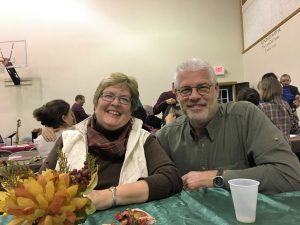 2 Thessalonians 1:3-4
2 Thessalonians 1:3-4
We ought always to thank God for you, brothers and sisters, and rightly so, because your faith is growing more and more, and the love all of you have for one another is increasing. Therefore, among God’s churches we boast about your perseverance and faith in all the persecutions and trials you are enduring (NIV).
Fellowship or sharing life with one another in Christ involves many practical and spiritual actions. Two of these are praying for and giving thanks for each other to God our Father. Too often we forget to think of ourselves part of a holy priesthood that serves in the temple of living stones (1 Peter 2:5). Think on this glorious position and privilege. We can lift up holy hands and praise God for his work of saving grace, in which he delivers us from sin and sets us free to live together for his glory. When we think of other believers in Jesus, it is a fitting occasion to thank God for our brothers and sisters. In our text, the apostle models how to do this part of priestly service.
- We can thank God because your faith is growing more and more. Here is the dimension toward God. As we have seen in a recent post on the Holy Spirit, faith is a gift of God. Our faith is nourished and increases as we remain in Christ’s love and draw fresh supplies of grace from him (cf. John 15 about the Vine and the branches). In the life of faith, we have continual occasions to see more grace, so that our confidence in the Lord rises. Notice carefully that God is the source of this intensification of trust. We cannot somehow make faith surge on our own. This is the reason God is praised for the growth of faith. We should also see that growth ought to be constant. Others ought to notice the progress of our faith.
- We can thank God because the love all of you have for one another is increasing. Here is the dimension toward each other. As with faith, so with love. God works in us and among us to make us love one another more than we have previously loved. The good news is that growth in love can occur in a gathering of believers even after years of neglect. God can restore the years that the locusts have eaten (see Joel). When we are ready to become serious in the practice of love in our small and big groups, we will see the Holy Spirit at work, changing minds and hearts. The Spirit can open the hearts of one believer for another, as we add brotherly affection to our faith. For this very reason, make every effort to supplement your faith with goodness, goodness with knowledge, knowledge with self-control, self-control with endurance, endurance with godliness, godliness with brotherly affection, and brotherly affection with love (2 Peter 1:5-7 HCSB).
- We can boast about your perseverance and faith in all the persecutions and trials you are enduring. Here is the dimension of our life together in the world. This boasting has a good quality, because it rejoices in the work of God in the lives of our brothers and sisters in Christ. We can often see other believers slapped around by the problems of life. Sometimes I cry out in prayer, “Lord, why are you making those people who love you experience so many trials? They seem to get out of one hole, only to be pushed into another! And we do pray for them and strive to help them. But there always seems to be another trial in their journey.” We should think of our brothers and sisters in severe persecution in the world. We ought to feel anguish of heart for them. When we hear of those suffering persecution and trials living by faith, it is a reason to give thanks for the grace active in them.
So then, let us act boldly in this spiritual service to God. Look around in your group. Who can you give thanks to God for the grace of God that is evident in them? Praise God for your brothers and sisters.
Grace and peace, David

 Philemon 1:7
Philemon 1:7 John 3:6
John 3:6 2 Timothy 1:13
2 Timothy 1:13 Third John 1:12
Third John 1:12 3 John 1:9-10
3 John 1:9-10 Third John
Third John Luke 14:25-33
Luke 14:25-33 1 Samuel 16:1-13
1 Samuel 16:1-13 Ruth 4:9-12
Ruth 4:9-12